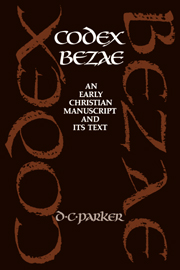Book contents
- Front Matter
- Contents
- List of illustrations
- Preface
- Abbreviations and textual conventions
- Introduction
- PART I The palaeography
- PART II The scribe and the tradition
- PART III The correctors
- PART IV The bilingual tradition
- Chapter Twelve The codex and the critics
- Chapter Thirteen A comparison of the columns
- Chapter Fourteen The character of the tradition
- Part V Text and codex
- Appendices
- Plates
- Notes on the plates
- Indexes
Chapter Twelve - The codex and the critics
Published online by Cambridge University Press: 09 November 2009
- Front Matter
- Contents
- List of illustrations
- Preface
- Abbreviations and textual conventions
- Introduction
- PART I The palaeography
- PART II The scribe and the tradition
- PART III The correctors
- PART IV The bilingual tradition
- Chapter Twelve The codex and the critics
- Chapter Thirteen A comparison of the columns
- Chapter Fourteen The character of the tradition
- Part V Text and codex
- Appendices
- Plates
- Notes on the plates
- Indexes
Summary
Mention was made of the Earse translation of the New Testament, which has lately been published, and of which the learned Mr. Macqueen of Sky spoke with commendation; but Mr. Maclean said, he did not use it, because he could make the text more intelligible to his auditors by an extemporary version. From this I inferred, that the language of the translation was not the language of the isle of Col.
This account (and I have no idea whether or not the inference was correct) comes from Dr Johnson's description of Col in his Journey to the Western Islands. It serves to introduce us to some of the dangers awaiting the student of a bilingual tradition. In the first place, the gap between intention and practice shows that a written document provides only partial evidence of what actually happened. In the second place, we have an instructive difference between written and extempore interpretation, which indicates that an account such as that describing the reading of Scripture in Jerusalem found in chapter 47 of the fourth-century Peregrinatio Aetheriae may not help us to understand a written text (see further chapter 15). Finally, the conclusion reached by Dr Johnson seems quite unjustifiable on this evidence. May not the venerable Mr Maclean have been objecting to the clarity of the translation rather than to the form of the Gaelic language which it represented? Or may he not have been prejudiced in favour of his own abilities against those of the translator?
How is the bilingual tradition of Codex Bezae to be interpreted? How and why did it arise? What effect did its creation have on the Greek and Latin texts it contains? Was it formed by making a translation of the Greek text before us, or was it created out of an existing Latin version? The proper way to attempt an answer to these problems is by establishing a correct method.
- Type
- Chapter
- Information
- Codex BezaeAn Early Christian Manuscript and its Text, pp. 183 - 193Publisher: Cambridge University PressPrint publication year: 1992



